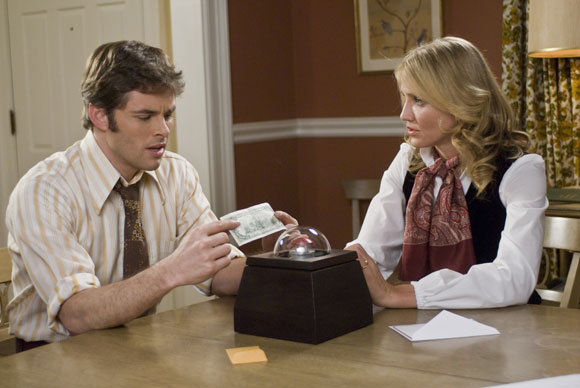The Box

Based on Richard Matheson’s short story, “Button, Button,” the film involves Norma (Cameron Diaz) and her husband, Arthur Lewis (James Marsden), in a dream-like setting of 1970’s Richmond, Virginia. The director seems to spare no expense in re-creating the era, mostly in the Lewis’ color-uncoordinated living room—the set of “Three’s Company.” Note how the sunflower-like sofa pattern matches the wallpaper. Does Ms. Diaz in a confused state deliberately resemble an aged Chrissie Snow?
At 5:45 A.M., the doorbell rings. A package appears at the doorstep, containing a box and a note, “Mr. Steward will call upon you at 5 P.M.”
A choice is put before them by the mysterious Mr. Steward. If they click the button on the box, they’ll be given one million dollars—tax-free, by the way. However, someone they do not know will also die. The moral dilemma is compounded by the fact that others will receive the box, and someone the others don’t know will die as well. Later, Norma observes she and Arthur are unknown to whomever might receive the other boxes. But the social experiment message could be disengaging were it not for the film’s sardonic wit, as when Norma worries over one of the neighbors catching on (as they are prohibited from telling anyone about the test), Arthur dryly replies, “Well then, push the button. See what happens.”
From stilted dialogues to spaces as sparsely furnished and diffusely overexposed as in Stanley Kubrick’s The Shining, I began to wonder whether or not all of this might be intentional. Norma, we discover, lost four of her toes in a radiation accident—or so we’re told. The instant one of her students ridicules her injury before the entire class, we know something’s… well, afoot. Even the disfigured Mr. Steward (Frank Langella) doesn’t set off my alarm bells. Not until the score, by Win Butler, plays ominously like a Bernard Hermann composition did it hit me: Director Richard Kelly is working in a style reminiscent of Hitchcock, “The Twilight Zone” and “The Outer Limits.” Further detective work reveals Matheson’s short story was, in fact, previously adapted into an episode of Rod Serling’s acclaimed series.
Even when Arthur emerges from some kind of hydro-suspension three feet above their bed, his landing is met with equal parts laughter and agitation. What exactly is going on? Clues lie scattered in Arthur’s employment with NASA, the Mars Viking probe for which he designed cameras, the inexplicable appearance of their son’s baby sitter Dana (Gillian Jacobs), and many others far weirder than are remotely hinted at by the film’s marketing campaign.
I recently read a blog post by a Christian analyzing the modern practice of Christianity. He dissected the difference between the mechanics of devotion—prayer, tithing, witnessing, etc.—and the commitment to truly selfless acts which have no bearing on the giver’s own salvation. It’s that bent with which The Box captured me unexpectedly. The question underlying the story, and Mr. Steward’s purpose, seems inspired by the Milgram Experiment.
Judging solely from the advertising, I expected to despise this film. While the story isn’t entirely original—unseen forces observing and manipulating us—the storytelling is engaging in ways largely absent from cinema in the past two, almost three, decades. Mr. Kelly’s earlier existential rumination, Donnie Darko, split audiences down the middle. This film is likely to confuse and elate halves of the audience, as well, but I feel that the narrative is considerably tighter—mystery brewing forth with every additional development. We could perhaps do without the awkwardly-executed dialogues. However, when taken in parallel with Sartre’s play “No Exit,” discussed by Norma an her students, the purpose is evidently to complete the surrealist tone.
Repeated references to “No Exit” also hint at another possible explanation for the bizarre series of events and melodramatic dialogues. The film doesn’t go flying off the deep end, as did David Lynch’s Mulholland Drive. Instead, it keeps us barely treading the surface of reality.
The film quotes Arthur C. Clarke’s Third Law, “Any sufficiently advanced technology is indistinguishable from magic.” It is indeed magical that I walked into a Cameron Diaz film expecting to be treated to shlock, and concluded that I had just witnessed the rebirth of the classical sci-fi/thriller.
 The Box • Dolby® Digital surround sound in select theatres • Aspect Ratio: 2.39:1 • Running Time: 115 minutes • MPAA Rating: PG-13 for thematic elements, some violence and disturbing images. • Distributed by Warner Bros. Pictures
The Box • Dolby® Digital surround sound in select theatres • Aspect Ratio: 2.39:1 • Running Time: 115 minutes • MPAA Rating: PG-13 for thematic elements, some violence and disturbing images. • Distributed by Warner Bros. Pictures